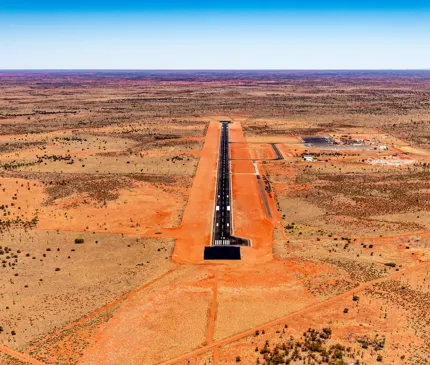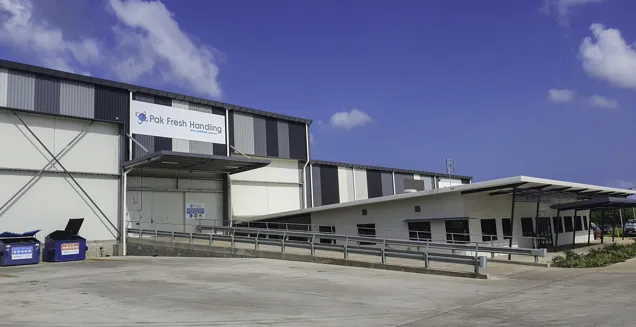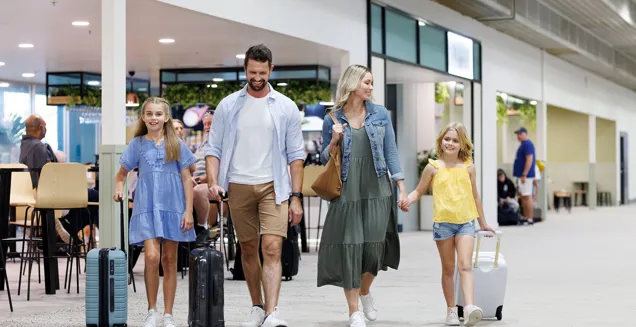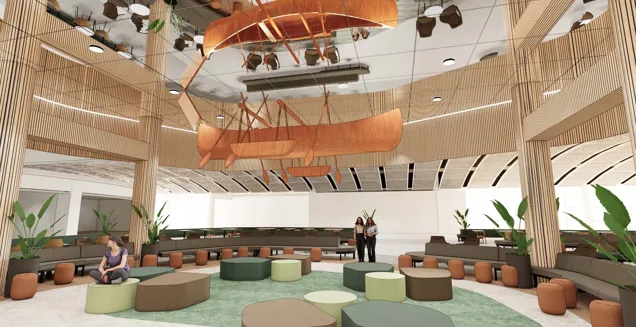Connellan Airport Upgrades and Accommodation
Learn how Voyages Indigenous Tourism Australia transformed Connellan Airport, boosting the Yulara region's economy, providing job opportunities, and ensuring continued emergency services for remote communities.
May 2018
Social Infrastructure
Yulara, NT

Connellan Airport is the gateway to the World Heritage Listed Uluru-Kata Tjuta National Park and the Central Australian outback. With NAIF’s backing, Voyages Indigenous Tourism was able to upgrade the airport and enable the continued safe provision of emergency services and flights for remote communities in the region.
About Voyages Indigenous Tourism Australia
Voyages Indigenous Tourism Australia Pty Limited, owner and operator of Ayers Rock Resort (ARR) near Uluru, secured their project finance from NAIF to upgrade Connellan Airport and support accommodation improvements. The airport is the main gateway for tourists visiting Uluru, handling around 360,000 passengers annually and serving as a critical hub for tourism, emergency, and community services.
Voyages Indigenous Tourism manages the Ayers Rock Resort, which is located 10 minutes from Connellan Airport and offers immersive experiences in Uluru.
Project Overview
The project involved the upgrade and resurfacing of the 2,600 m airport runway, taxiway and apron, as well as the improvement of runway lighting.
Construction was completed in December 2019 and included the building of permanent accommodation to support workers during the runway upgrade and future refurbishment projects.
The construction work was led by the principal contractor Downer EDI Works. The runway lighting was completed by specialist aircraft lighting contractor Airside Technical.
How We Helped
NAIF supported the Connellan Airport and accommodation upgrades with flexible, long-term concessional finance. We helped de-risk the project for stakeholders and encouraged additional involvement from commercial banks and partners.
Through this support, critical infrastructure works, including airport upgrades and contractor accommodation, were able to proceed, strengthening regional connectivity and supporting long-term economic activity in Central Australia.
Public Benefit
The project is a key economic enabler for the Yulara region, particularly tourism to the world-heritage Uluru-Kata Tjuta National Park and has provided Indigenous training opportunities. Independent analysis projected that the airport upgrade will deliver approximately $376 million in economic benefit to the region over 20 years—a $18 return for every $1 spent.
The project is expected to create around 320 additional full-time jobs, with a strong focus on Indigenous employment and training. The upgrades will improve access to healthcare and essential services for remote communities and support ongoing opportunities for local businesses and Indigenous communities through Voyages’ Indigenous Engagement Strategy.
Related Links
Indigenous Engagement
- Anangu
Yulara, located in the Northern Territory, lies on the traditional lands of Anangu, who are the Traditional Owners of Uluru, Kata Tjuta, and the surrounding Country. The term Anangu encompasses several distinct peoples, in particular the Ngaanyatjarra, Pitjantjatjara, and Yankunytjatjara groups. Central to Anangu culture is Tjukurpa, the foundation of Anangu law, knowledge, spirituality and identity.
Tjukurpa guides all aspects of life, from land management to social conduct, and shapes the stories of important ancestral beings such as Mala (hare wallaby), Kuniya (woma python), and Liru (poisonous snake). Cultural knowledge is passed down orally through stories, songs, ceremonies, art, and daily practices.
Anangu mainly speak Pitjantjatjara and Yankunytjatjara. Pitjantjatjara and Yankunytjatjara are dialects of the Western Desert language. The nearby Mutitjulu community, located at the base of Uluru, plays a vital role in maintaining these traditions and co-managing the Uluru-Kata Tjuta National Park in partnership with the Australian Government.
Anangu are also actively involved in cultural tourism, training, and employment initiatives at Yulara and the Ayers Rock Resort, helping to preserve language, share cultural knowledge, and ensure their continued custodianship of this ecologically and spiritually significant region.
Indigenous Engagement Strategy Commitments
- Support culturally informed governance through the Anangu Advisory Group. Voyages will strengthen engagement with Anangu Traditional Owners by sharing information, identifying opportunities for collaboration, and ensuring local aspirations are embedded into tourism, employment, and training activities. The Group provides continuous feedback on operational performance and ensures transparency through regular communication with regional Anangu bodies.
- Community investment via the Anangu Communities Foundation. The Foundation will adopt a regional engagement model to raise awareness, support grassroots project development, and expand fundraising efforts. It will work with Anangu organisations to co-design initiatives, strengthen local capacity, and partner with external supporters where needed.
- Committed to achieving a minimum 3% Indigenous procurement target. This will be supported by strong governance, accurate data tracking, and regional engagement strategies that connect local Indigenous businesses with procurement opportunities across their remote sites.
- Provide meaningful employment through the Real Jobs Program. The program will support Anangu participants to transition into long-term employment, using case management, mentoring, language, literacy and numeracy support, and tailored workplace training. Internal staff capability will be strengthened to manage and support Indigenous employees effectively.
- Create local employment pathways through partnerships with Job Network and Community Development Program providers, Voyages will help job seekers from the NPY and Central Australia region build skills, complete site visits and work placements, and access recruitment support to transition into employment at Ayers Rock Resort.
- Committed to education pathways with school-based workplace exposure and experience for primary and secondary students in the Ngaanyatjarra Pitjantjatjara Yankunytjatjara (NPY) and Central Australia region. Program design will be refined through education partnerships, with a focus on transitioning students into future training or employment.
- Committed to training pathways through the National Indigenous Training Academy. The Academy offers Certificate III traineeships in hospitality, retail, horticulture and tourism. Participants receive targeted support including mentoring, wellbeing programs, and skill development in language, literacy and numeracy support and digital literacy. A post-training community fosters continued networking and career growth.
- Support culturally safe wellbeing and professional development. Voyages will implement a comprehensive wellbeing framework at Ayers Rock Resort, including counselling, critical incident response, and wellness programs. It will offer life-long learning and professional development for Indigenous and non-Indigenous staff and build local service partnerships to respond to community needs.
Indigenous Engagement Strategy Outcomes
- In 2019, Voyages exceeded the 10% First Nations employment target during peak construction months, with contractor accommodation works achieving up to 35% Indigenous participation. The Anangu Advisory Group (AAG) was established, and community engagement mechanisms were enhanced to improve Anangu economic participation.
- In 2020, despite significant disruptions caused by COVID-19, Voyages supported several Real Jobs Program (RJP) participants into full-time roles, enhanced support models, and developed online training solutions for the Certificate I in Hospitality. The National Indigenous Training Academy (NITA) celebrated its 500th graduate and supported 51 trainees on-site.
- In 2021, the First Nations workforce reached 292, including 253 staff based at the Resort. Indigenous procurement reached 4.2%, and four Anangu led community projects were funded. Voyages formalised its participation in the Ngaanyatjarra Pitjantjatjara Yankunytjatjara (NPY) Empowered Communities initiative, strengthening regional partnerships and employment pathways.
- In 2022, First Nations employment totalled 257, with the highest ever Anangu representation in leadership roles. Indigenous procurement rose to 5.4% ($3.4m). The Wintjiri Wiru Uluru drone show was developed through best practice cultural consultation and is expected to deliver $1.8m back to community over four years.
- In 2023, Voyages maintained 257 Indigenous staff, including nine RJP participants and 75 active NITA trainees. A record 15 of 17 graduating trainees transitioned into full-time employment. The Cultural Authority Group continued to guide cultural initiatives, and First Nations procurement remained at 5.4%, exceeding the 3% target.
- In 2024, First Nations employment at the project reached 26.4%, with 11% identifying as Anangu. First Nations procurement reached 6.5%, including both Voyages certified and Supply Nation certified suppliers. The AAG resumed regular meetings, and 40% of the Indigenous Engagement team were Anangu. The RJP continued to support Anangu transitions into skilled roles, offering wraparound case management and alignment to nationally recognised qualifications, with participants involved in land management, cultural tourism, and training streams such as NITA’s hospitality programs.
- In 2025, Voyages aims to further strengthen First Nations procurement, improve Anangu representation across all employment levels, and expand culturally responsive wellbeing frameworks, community engagement models, and employment pathways throughout the NPY and Central Australia regions.


